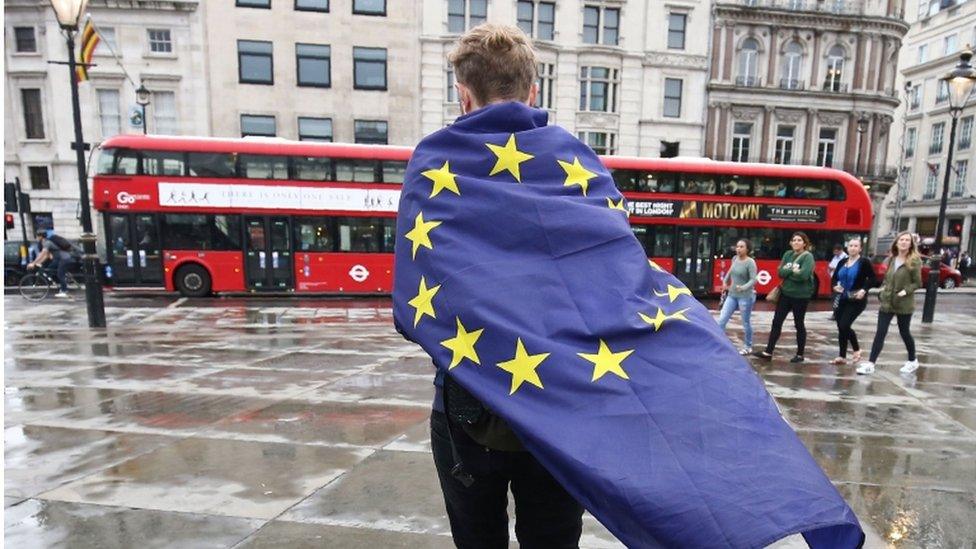Brexit: Public safety 'could be threatened by lack of data sharing'
- Published
- comments

Three-quarters of the UK's cross-border data flows are with EU countries
Public safety could be threatened unless the government "gets its act together" over data-sharing after Brexit, a former Met Police boss says
Lord Condon said it could become "much more difficult" for police to share information with EU counterparts unless transitional arrangements are made.
He sits on a Lords committee that has called for guarantees the UK will continue to meet shared standards.
It said private firms could also be affected by a "cliff edge" scenario.
Speaking on BBC Radio 4's Today programme, Lord Condon said the current data-sharing arrangements allowed UK police to access things like number plate information, fingerprints and DNA "almost instantaneously".
He said "bread and butter policing" was not under threat, but added: "There is a danger that from the end of March 2019, unless our government gets its act together on this issue, it will be much much harder to check those databases and therefore our citizens could be less safe."
Unless new ways of "accrediting" the UK's data handling systems are found, Lord Condon warned it was possible EU countries may not be legally allowed to share data with the EU, even if they want to.
He added that the UK's red line on accepting European Court of Justice rulings was the "biggest legal impediment" to transitional arrangements being made.
UK government ministers have stressed that they want to maintain the same levels of crime and security co-operation with the EU after Brexit.
Unhindered data flows
The EU Home Affairs sub-committee is charged with scrutinising proposed EU legislation on home affairs, health and education.
It and the other five sub-committees of the House of Lords EU Committee are investigating key issues expected to arise in the negotiations over Brexit.
The committee said disruption to data sharing could present a non-tariff trade barrier and hinder law enforcement co-operation.
Its chairman, Lord Jay, voiced concern over lack of detail in government plans to maintain unhindered data flows.
"The volume of data stored electronically and moving across borders has grown hugely over the last 20 years," Lord Jay said.
"Between 2005 and 2012 alone, internet traffic across borders increased 18-fold. The maintenance of unhindered data flows is therefore crucial, both for business and for effective police co-operation."
Three-quarters of the UK's cross-border data flows are with EU countries, according to the report.
The sub-committee, Lord Jay said, was concerned that EU and UK data protection rules could diverge over time after the UK had left the EU.
'Too early to say'
The report accepts that the Government has been "unequivocal about the need to maintain stability and ensure 'unhindered' and 'uninterrupted' data flows between the UK and the EU post-Brexit" but says it must take action sooner.
When asked how the Government intended to achieve its goal of unbroken data flows, Matt Hancock MP, minister of state for digital, told the sub-committee there were "many different ways this could work" but he did "not want to stress any particular option".
Baroness Williams, minister of state at the Home Office, suggested it was "too early to say what the future arrangements might look like".
In response, the sub-committee recommends securing an "adequacy decision" for the UK - a ruling by the European Commission that a non-EU country has ensured an adequate level of protection of personal data and no further safeguards are required.
Lord Jay also urged the Government to secure a continuing role for the UK's information watchdog, the Information Commissioner's Office, on the European Data Protection Board.
The report notes the UK has a track record of influencing EU rules on data protection and retention, and risks losing its influence after Brexit.
The UK is scheduled to leave the EU on 29 March 2019, following last year's referendum, though the departure date may be extended if all 28 EU members agree.
- Published30 December 2020

- Published16 July 2017

- Published15 July 2017

- Published10 July 2017

- Published28 March 2017
